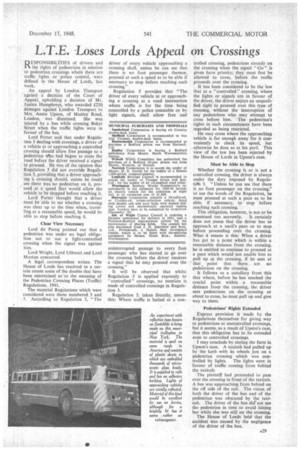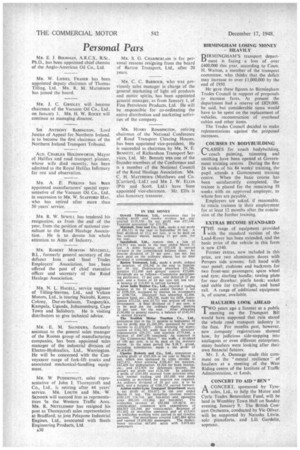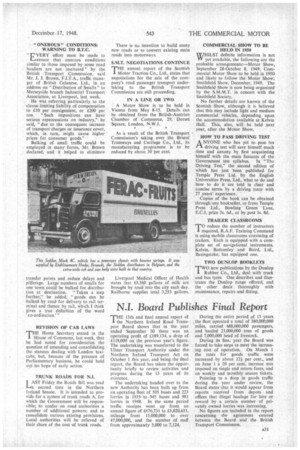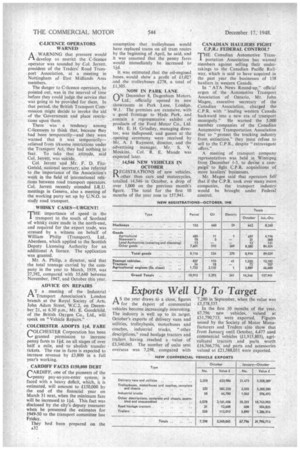L.T.E. Loses Lords Appeal on Crossings R ESPONSIBILITIES of drivers and
Page 31

Page 32

Page 33

Page 34

If you've noticed an error in this article please click here to report it so we can fix it.
the rights of pedestrians in relation to pedestrian crossings where there are traffic lights or police control, were defined in the House of Lords, last week.
An appeal by London Transport against a decision of the Court of Appeal, upholding a decision of Mr. Justice Humphrey; who awarded 1250 damages against London Transport to Mrs. Annie Upson, of Manley Road, London, was dismissed. She was injured by a bus while crossing Baker Street when the traffic lights were in favour of the bus.
Lord Porter said that under Regulation 5 dealing with crossings, a driver of a vehicle at or approaching a controlled crossing should allow free passage to a pedestrian vt'ho had begun to cross the road before the driver received a signal to proceed. He was of the opinion that Regulation 5 did not override Regulation 3, providing that a driver approaching a crossing should, unless he could see there was no pedestrian on it, proceed at a speed that would allow the vehicle to be stopped before reaching it.
Lord Porter thought that a driver must be able to see whether a crossing was clear up to the time when, travelling at a reasonable speed, he would be able to stop before reaching it.
Clear View Necessary Lord du Parcq pointed out that a pedestrian was under no legal obligation not to use a light-controlled crossing when the signal was against him.
Lord Wright, Lord Uthwatt and Lord Morton concurred.
A legal correspondent writes: The House of Lords has resolved to a certain extent some of the doubts that have been entertained as to the meaning of the Pedestrian Crossing Places (Traffic) Regulations, 1941.
The material Regulations which were considered were those numbered 3 and 5. According to Regulation 3, "The
driver of every vehicle approaching a crossing shall, unless he can see that there is no foot passenger thereon, proceed at such a speed as to be able if necessary to stop before reaching such crossing."
Regulation 5 provides that "The driver of every vehicle at or approaching a crossing at a road intersection where traffic is for the time being controlled by a police constable or by light signals, shall allow free and
uninterrupted passage to every foot passenger who has started to go over the crossing before the driver receives a signal that he may proceed over the crossing."
It will be observed that whilst Regulation 5 is applied expressly to "controlled" crossings, no mention is made of controlled crossings in Regulation 3.
Regulation 5, taken literally, means this: Where traffic is halted at a con trolled crossing, pedestrians already on the crossing when the signal " Go " is given have priority; they must first be allowed to cross, before the traffic proceeds over the crossing.
It has been considered to be the law that at a "controlled" crossing, where the lights or signals are in favour of the driver, the driver enjoys an unqualified right to proceed over this type of crossing, without the interruption of any pedestrians who may attempt to cross before him. The pedestrian's rights in such circumstances have been regarded as being restricted.
He may cross where the approaching vehicle is far enough away for it conveniently to check its speed, but otherwise he does so at his peril. This view of the law has been rejected by the House of Lords in Upson's case.
Must be Able to Stop
Whether the crossing is or is not a controlled crossing, the driver is always under the duty imposed by Regulatidh 3. "Unless he can see that there is no foot passenger on the crossing," to use the words of the Regulation, be must proceed at such a pace as to be able, if necessary, to stop before reaching such crossing.
This obligation, however, is not to be
construed too narrowly. It certainly does not mean that the driver has to approach at a snail's pace or to stop before proceeding over the crossing. What it means is this: When a driver has got to a point which is within a reasonable distance from the crossing, he is entitled to continue to proceed at a pace which would not enable him to pull up at the crossing, if he sees at that, point that there are no pedestrians on the crossing.
It follows as a corollary from this that where, before he has reached the crucial point within a reasonable distance from the crossing, the driver sees pedestrians on the crossing or about to cross, he must pull up and give way to them.
Pedestrians' Rights Extended Expreis provision is made by the Regulations themselves for giving way to pedestrians at uncontrolled crossings, but it seems, as a result of Upson's case, that this obligation has to be extended even to controlled crossings.
I may conclude by stating the facts in Upson's case. A taxicab had pulled up by the kerb with its wheels just on a pedestrian crossing which was controlled by lights. The lights were in favour of traffic coming from behind the taxicab.
The plaintiff had proceeded to pass over the crossing in front of the taxicab. A bus was approaching from behind on the off side of the cab. The vision of both the driver of the bus and of the pedestrian was obscured by the taxicab. The driver of the bus dicrnot see the pedestrian in time to avoid hitting her while she was still on the crossing.
The House of Lords held that the accident was caused by the negligence of the driver of the bus. BIRMINGHAM LOSING MONEY HEAVILY
D IRMING HAM'S transport depart
ment is facing a loss of over £400,000 this year, according to Coun. H. Watton, a member of the transport committee, who thinks that the deficit may increase to over £1.000,000 by the end of 1950.
He gave these figures to Birmingham Trades Council in support of proposals to increase fares. At present the department had a reserve of £829.000. he said, but considerable sums would have to be spent on the replacement of vehicles, reconstruction of overhead cables and other items.
The Trades Council decided to make representations against the proposed i ncreases.
COURSES IN BODYBUILDING ("LASSES for coach bodybuilding.
coach painting, trimming and smithing have been opened at Government training centres, During the first 26 weeks of his 84 weeks' training, the pupil attends a Government training centre. When the basic course has been satisfactorily completed, the trainee is placed for the remaining 58 weeks with an approved employer, to whom fees are payable.
Employers are asked. if reasonable, to retain trainees in their employment for at least 12 months after the conclusion of the further training.
EXTRAS BECOME STANDARD
THE range of equipment provided with the standard version of the Land-Rover has been extended, and the basic price of the vehicle in this form is now £540.
Former extras, now included in this price, are two aluminium doors with Perspex side screens; full hood with rear panel; cushions and backrests for two front-seat passengers; spare wheel and tyre; starting handle; towing plate for rear drawbar; pintle hook; socket and cable for trailer light, and hand rail. A range of 'additional equipment is, of course, available.
HAULIERS LOOK AHEAD
TWOyears ago a listener at a public meeting on the Transport Bill would have supposed that ruin stared the whole road transport industry in the face. For months past, however.. new company registrations showed how, by judicious side-stepping into analagous or even different enterprises. many hauliers were looking after their own financial futures,
Mr. J. A. Dunnage made this comment on the "mental resilience" of hauliers at a meeting of the West Riding centre of the Institute of Traffic Administration, at 'Leeds.
CONCERT TO AID "BEN"
A CONCERT, sponsored by TyreL1 soles, Ltd., to help the Motor and Cycle Trades Benevolent Fund, will be held in Wembley Town Hall on Sunday evening, January 9. The British Concert Orchestra, conducted by Vic Oliver, will be supported by Natasha Litvin, solo pianoforte. and Lili Gardelle, soprano,.
"ONEROUS" CONDITIONS: WARNING TO B.T.C.
"L' VERY effort must he made to
1–'ensure that onerous conditions similar to those imposed by some road hauliers are not instituted" by the British Transport Commission, said Mr. J. J. Brown, F.I.T.A., traffic manager of British Celanese, Ltd., in an address on "Distribution of Smalls" to Merseyside branch Industrial Transport Association, at Liverpool, last week.
He was referring particularly to the clause limiting liability of compensation to £10 per consignment, or £200 per ton. "Such impositions can have serious repercussions on industry," he said, "due to the consequent increase of transport charges or insurance cover, which, in turn, might cause higher prices for consumer goods."
Bulking of small traffic could be employed in many forms, Mr. Brown declared, and it helped to eliminate transfer points and reduce delays and pilferage. Large numbers of smalls for one town could be bulked for distribution at destination. " Taken a step further," he added, "goods can be bulked by road for delivery to rail terminal and thence by rail, which I think gives a true definition of the word 'co-ordination.'" REVISION OF CAB LAWS
E Home Secretary stated in the PiIouse of Commons, last week, that he had noted for consideration the question of amending and consolidating the statutes dealing with London taxicabs, but, because of the pressure of Parliamentary business, he could hold out no hope of early action.
TRUNK ROADS FOR NJ.
I AST Friday the Roads Bill was read second time in the Northern Ireland Senate. It is intended to provide for a system of trunk roads A, for which the Government will be responsible; to confer on road authorities a number of additional powers; and to consolidate various existing provisions. Local authorities will be relieved of their share of the cost of trunk roads. There is no intention to build many new roads or to convert existing main roads into motorways.
S.M.T. NEGOTIATIONS CONTINUE THE annual report of the Scottish Motor Traction Co., Ltd., states that negotiations for the sale of the company's road passenger transport undertaking to the British Transport Commission are still proceeding.
IN A uNg OR TWO
A Motor Show is to be held in Vienna from May 8-15. Details can be obtained from the British-Austrian Chamber of Commerce, 29, Dorset Square, London. N.W.1.
As a result of the British Transport Commission's taking over the Bristol Tramways and Carriage Co., Ltd., its manufacturing programme is to be reduced by about 30 per cent.
Liverpool Medical Officer of Health states that 63,560 gallons of milk are brought by road into the city each day. Railborne supplies total 3,253 gallons. COMMERCIAL SHOW TO BE HELD IN 1950 WHILST definite information is not VV yet available, the following are the probable arrangements:—Motor Show, September 28-October 8, 1949; Commercial Motor Show to be held in 1950 and likely to follow the Motor Show; Smithfield Show, December, 1949. The Smithfield Show is now being organized by the S.M.M.T. in concert with the Smithfield Society.
No further details are known of the Scottish Show, although it is believed that this may include light and medium commercial vehicles, depending upon the accommodation available at Kelvin Hall. This, also, will be held next year, after the Motor Show, HOW TO PASS DRIVING TEST
ANYONE who has yet to pass his driving test will save himself much time and anxiety by first acquainting himself with the main features of the Government test syllabus. in "The Driving Test," the second edition of which has just been published for Temple Press Ltd. by the English Universities Press, Ltd., what to do and how to do it are told in clear and concise terms by a driving tutor with 27 years' experience. •
Copies of the book can be obtained through any bookseller, or from Temple Press Ltd., Bowling Green Lane, E.C.1, price 3s. 6d., or by post 3s. 8d.
TRAILER CLASSROOMS
TO reduce the number of instructors
required, R.A.F. Training Command is using mobile classrooms consisting of trailers. Each is equipped with a complete set of navigational instruments. Kelvin, BottomIey and Baird, Ltd., Basingstoke, has equipped one.
TWO DUNLOP BOOKLETS
TWO new publications by the Dunlop Rubber Co., Ltd., deal with truck and bus tyres. One describes and illustrates the Dunlop range offered, and the other deals thoroughly with maintenance, repairs and fitting.
C-LICENCE OPERATORS WARNED
A. WARNING that pressure would develop to restrict the C-licence operator was sounded by Col. Jerrett, president of the Traders' Road Transport Association, at a meeting in Nottingham of East Midlands Area members,
The danger to C-licence operators, he pointed out, was in the interval of time before they could judge the service that was going to be provided for them. In that period. the British Transport Commission might decide to invoke the aid of the Government and place restrictions upon them.
There was a tendency among C-licensees to think that, because they had been temporarily-and they were warned that it was temporarilytelieved from irksome restrictions under the Transport Act, they had nothing to fear. To take that attitude, said Col. Jerrett, was suicide.
Col. Jerrett and Mr. F. D. FitzGerald, national secretary; also referred to the importance of the Association's work in the field of international relations between road transport operators. Col. Jerrett recently attended LR.U. meetings in Geneva, also a meeting of the working party set up by U.N.O. to study road transport.
WHISKY CASES-URGENT!
THE importance of speed in the transport to the south of Scotland of whisky cases made in the north-east, and required for the export trade, was stressed by a witness on behalf of William Philip (Transport), Ltd., Aberdeen, which applied to the Scottish Deputy Licensing Authority for an additional A licence. The application was granted.
Mr. A. Philip, a director, said that the total tonnage carried by the company in the year to March, 1939, was 27,392, compared with 35,640 between November, 1947, and October this year.
ADVICE ON REPAIRS T a meeting of the Industrial Transport Association's London branch at the Royal Society of Arts, John Adam Street, W.C.2, on December 21, at 6.30 p.m., Mr. E. Goodchild, of the British Oxygen Co., Ltd., will speak on "'Vehicle Repairs."
COLCHESTER ADOPTS lid. FARE
rOLCHESTER Corporation has been
granted permission to increase penny fares to lid. on all stages of over half a mile, and to abolish transfer tickets. The rise in fares is expected to increase revenue by £3,800 in a full year's working.
CARDIFF FACES £150,000 DEBT
CARD1FF, one of the pioneers of the ....penny pay-as-you-enter system; is faced with a heavy deficit, which, it is estimated, will amount to £150,000 by the end of the financial year on March 31 next, when the minimum fare will be increased to lid. This fact was disclosed by the city's deputy treasurer when he presented the estimates for 1949-50 to the transport committee last Friday.
They had been prepared on the A32 assumption that trolleybuses would have replaced trams on all tram routes by the beginning of April, he said, and it was assumed that the penny fares would immediately be increased to I id.
It was estimated that the oil-engined buses would show a profit of £1,027 and the trollcybuses £278, a total of £1,305.
NOW IN PARK LANE
ON December 8, Dagenham Motors, Ltd., officialky opened its new -showrooms in Park Lane, London, W.I. The premises are extensive, with a good frontage to Hyde Park, and contain a representative exhibit of products of the Ford Motor Co., Ltd.
Mr. E. H. Grindley, managing director, was indisposed, and guests at the opening ceremony were received by Mr. A. J. Rayment, director, and the advertising manager, Mr. S. V. Meakins. Col. R. E. Maude was expected later.
14,546 NEW VEHICLES IN OCTOBER D EG1STRA7IONS of new vehicles, 1.N other than cars and motorcycles, totalled 14,546 in October, a drop of over 1,000 on the previous month's figure. The total for the first 10 months of the year rose to 157,941.
CANADIAN HAULIERS FIGHT
C.P.R.: FEDERAL CONTROL? THE Canadian Automotive Trans
portation Association has warned members against selling their undertakings to the Canadian Pacific Railway, which is said to have acquired in the past year the businesses of 138 hauliers in western Canada.
In " ATA News Round-up," official organ of the Automotive Transport Association of Ontario, Mr. John Magee, executive secretary of the Canadian Association, charged the C.P.R. with "leading western Canada backward into a new era of transport monopoly." He warned the 5,000 member companies of the Canadian Automotive Transportation Association that to "protect the trucking industry from extinction," they must refuse to sell to the C.P.R., despite "extravagant offers."
A meeting of transport company representatives was held in Winnipeg from December 1-3, to devise a campaigti to fight C.P.R. acquisitions of more hauliers' businesses.
Mr. Magee said that operators felt that if -the C.P.R. took over many more companies, the transport industry would be brought under Federal control.




























































































